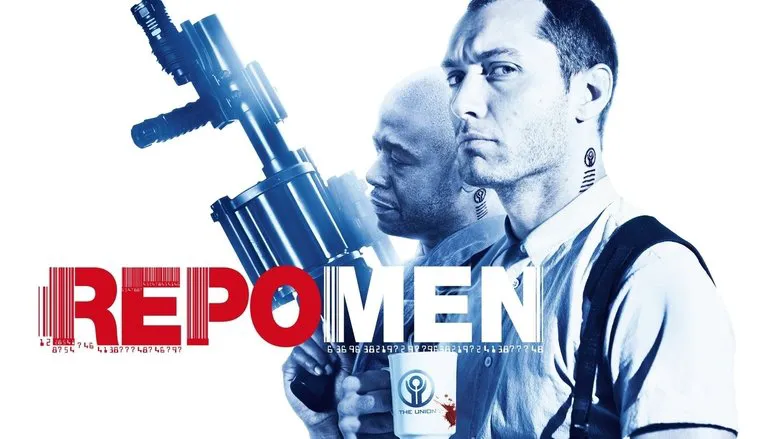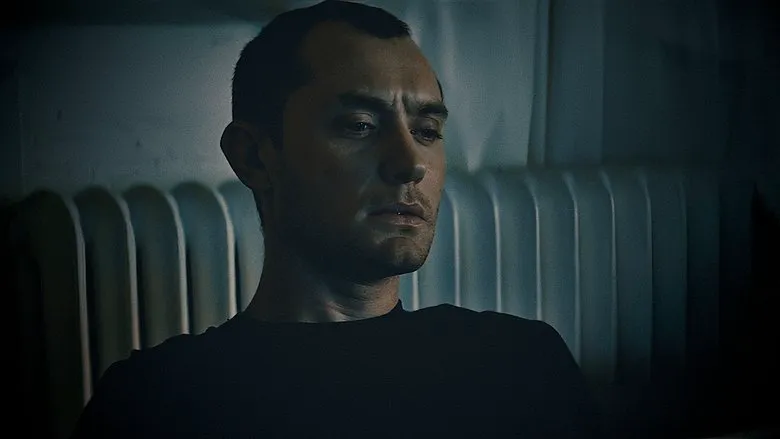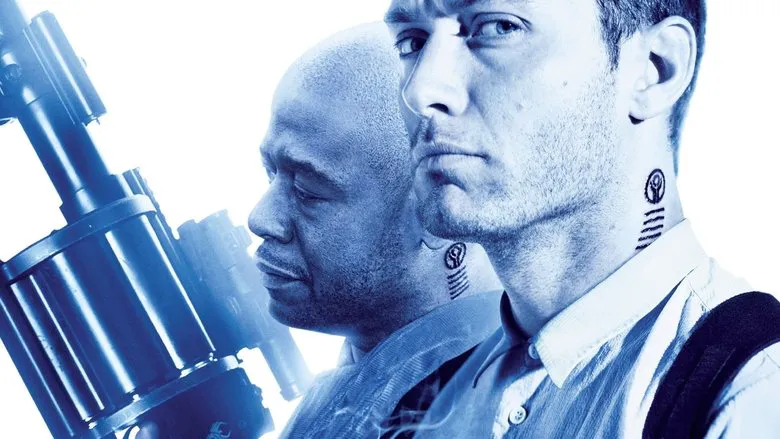Repo Men: A Visceral Tale Where Business Meets Blood
Before delving into the brutal world of “Repo Men,” consider this a mild advisory: a pre-screening warm-up with films known for their unsparing intensity might be in order, just to acclimatize yourself to the visceral experience that awaits. This isn’t merely a sci-fi thriller; it’s a deep dive into a dark, often shockingly gruesome iteration of capitalism.
 Promotional poster for Repo Men, featuring Jude Law and Forest Whitaker.
Promotional poster for Repo Men, featuring Jude Law and Forest Whitaker.
Set in a not-so-distant dystopian future, “Repo Men” unveils a chilling medical landscape where the marvels of modern organ transplantation have rendered body parts readily available. In this grim reality, a new liver is as accessible as a car loan – incredibly convenient if you can afford it. However, for those who default on their hefty, life-sustaining debts, there’s a price to pay, and it’s exacted not in currency but in flesh and blood. Enter Remy and Jake, the titular “Repo Men.” Employed by a powerful medical corporation known as The Union, their chilling efficiency in repossessing overdue organs from delinquent clients is legendary. Their world, however, is turned upside down when a twist of fate sees Remy himself struck down by heart failure, subsequently drowning in debt and staring down the very grim reality he once mercilessly imposed on others.
Foreign distributors, perhaps aiming for shock value, opted for titles that explicitly hinted at excessive gore. Yet, the original title, “Repo Men,” more accurately captures the film’s chillingly business-like approach. These aren’t just sadistic butchers delighting in torment; they are cold-blooded repossessors, professionals operating within a corporate structure. Union, a seemingly reputable company, pays them a decent, steady wage for their grisly work. For Remy and Jake, bloodshed is simply an inevitable, detached part of the job description – nothing personal. Their hands are constantly stained crimson, to be sure, but that’s an unavoidable occupational hazard when one is literally extracting an overdue liver from a living, struggling body.
 A scene from Repo Men depicting a brutal organ repossession.
A scene from Repo Men depicting a brutal organ repossession.
A Pound of Flesh in a Futuristic Setting
The film’s darkly humorous and inherently bleak premise might initially strike viewers as profoundly novel, a unique twist on the sci-fi genre. However, a deeper examination reveals a narrative thread intimately familiar throughout literary history. The colossal and predatory medical conglomerate, Union, bears an uncanny and disturbing resemblance to Shakespeare’s avaricious Shylock from “The Merchant of Venice.” Both demand a literal “pound of flesh” as collateral for a defaulted contract, albeit Union’s operation is scaled to terrifying, industrialized heights Shylock could only dream of.
 Surgical tools and a syringe, hinting at the medical and violent themes of Repo Men.
Surgical tools and a syringe, hinting at the medical and violent themes of Repo Men.
Beyond its Shakespearean echoes, “Repo Men” initially presents itself as a compelling workplace drama. It meticulously showcases the harsh daily routines and the unsettling camaraderie between two loyal partners. Imagine “Miami Vice” met “ER” in a far more cynical, ultra-violent future, with an intense focus on the unique ethical ambiguities and raw medical procedures inherent in their profession. In classic Hollywood fashion, the duo comprises two contrasting personalities embodying a blend of grit and cold professionalism.
 Remy (Jude Law) and Jake (Forest Whitaker) during a repossession, showcasing their partnership.
Remy (Jude Law) and Jake (Forest Whitaker) during a repossession, showcasing their partnership.
The Cracking of a Stone Heart
Jude Law masterfully portrays Remy, a character defined by the steady, unyielding precision of his hands, honed by countless surgical procedures, and an emotionally glacial demeanor. He possesses a heart that, for all intents and purposes, appears to be made of stone – impervious to the suffering he inflicts. Yet, the profound irony and central conflict of the film emerge when this hardened exterior begins to irrevocably crack following a life-altering workplace accident. Remy is forced to receive an artificial heart, a technological marvel that, paradoxically, proves to be surprisingly sensitive and capable of eliciting profound empathy.
 A close-up of Jude Law as Remy, reflecting his conflicted nature.
A close-up of Jude Law as Remy, reflecting his conflicted nature.
Much like Maxim Gorky’s mythical Danko, who heroically tore out his own heart to illuminate the path for others, Remy discovers a burgeoning desire to share his newfound empathy with the desolate world around him, particularly with a specific, intriguing woman. His love interest is, in a tragically poetic sense, “perfect,” despite the fact that her body contains no original organs. Every single piece of her has been acquired on credit, payments long past due, making her a prime target for repossession. Yet, the reformed Repo Man, experiencing emotions he once suppressed, loves her precisely as she is, all borrowed organs included, setting the stage for a desperate, bloody fight for two lives and perhaps, for redemption.
 Remy (Jude Law) and Beth (Alice Braga), his artificial organ-laden love interest.
Remy (Jude Law) and Beth (Alice Braga), his artificial organ-laden love interest.